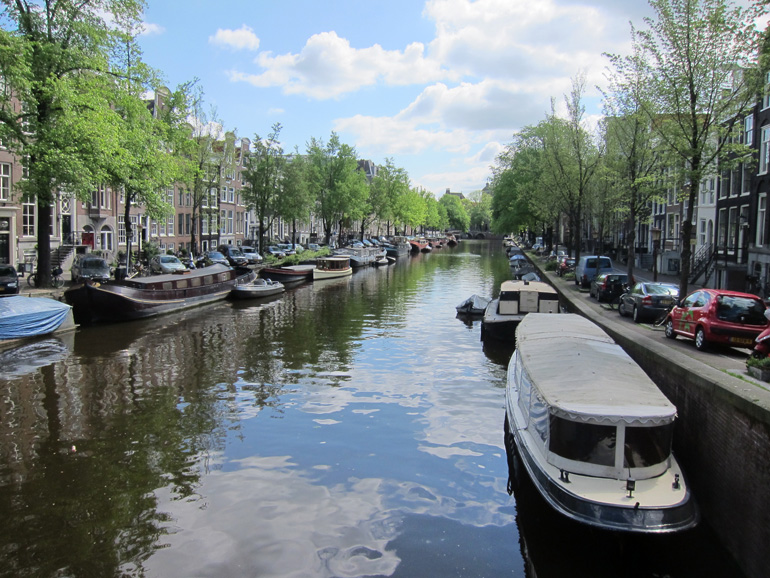Amsterdam/London:
“Maar ik ben ook God maar.”
14 May 2012
The world wasn’t ready for Nescio. I’m speaking of the writer who wasn’t well known even in the Netherlands until after his death, at the age of 79, in 1961. In 1961, the world was not even ready for the Beats, the idealistic young men whose future Nescio foretold in less than a handful of stories written before World War I. His predictions have been so completely established by experience that idealistic young men are now more likely to be seen as self-indulgent than as high-minded. This would have saddened him. He liked to think that the future would turn out endless generations of idealistic young men, sitting on the shore and dreaming about capturing the sun, or “blowing up all the offices,” even if he knew that the luckier among them would wind up prospering, as he did, in those very offices.
Gods tron is nog ongeschokt. Zijn wereld gaat haar gang maar. Af en toe glimlacht God even om de gewichtige heeren, di denken dat ze heel wat beteekenen. Nieuwe Titaantjes zijn al weer bezig kleine rotsblokjes op te stapelen om ‘m van z’n verhevenheid te storten en dan de wereld eens naar hun zin in te richten. Hij lacht maar en denkt: ‘Goed zoo jongers, zoo mal als je bent, ben je me toch liever dan die mooie wijze heeren. ‘t Spijt me dat je je nek moet breken en dat ik die heeren moet laten gedijen, maar ik ben ook God maar.’ En zoo gaat alles z’n gangetje en wee hem die vraagt: Waarom?
*
God’s throne is still unshaken. His world just takes its course. Now and then God smiles for a moment about the important gentlemen who think they’re really something. A new batch of little Titans are still busy piling up little boulders so that they can topple him down off his heights and arrange the world the way they think it should be. He only laughs, and thinks: “That’s good, boys. You may be crazy but I still like you better than the proper, sensible gentlemen. I’m sorry you have to break your necks and I have to let the gentlemen thrive, but I’m only God.”
And so everything takes its little course, and woe to those who who ask: Why?
That is the end of Titaantjes (Young Titans), the second of three (or four) early short stories upon which Nescio’s reputation largely rests. (The English rendering is by Damion Searls; it appears in NYRB’s collection, Amsterdam Stories.) If there are still any young titans piling up rocks anywhere, they probably have no higher view than storming the Internet and setting it to rights. Which they may in fact do. The Twentieth Century taught us that our ideals especially must be realistic. Otherwise we wind up in a sanitarium, like Bavink, the young titan who loses his grip just as his paintings begin to command high prices, or else collaborating enthusiastically with Nazis. (Fritz Grönloh, the man behind Nescio, spent the Occupation in retirement; he was almost sixty when it began.) We have to begin by taking people as they are.
Which is what makes these stories so endearing. Idealistic young men aren’t particularly well-behaved, and their habits tend toward the slovenly; their manners excite the impatience of everyone who has found a settled place in the world. But not Nescio’s. He may have put utopian dreams behind him, but he has not drawn a line beneath the innocent hope of young dreamers. Innocence makes them, like the lilies of the field, beloved of God, who, in Nescio’s view, prefers them to hardworking meritocrats. Just so long as they outgrow that innocence, and stop asking “Why?”
No: when Grönloh died, the youth of all the Western world was about to embark on a prolonged Titanic project that, happily, wore away in the tides of time, and never got high enough to collapse and cause damage. Nobody would have wanted to read Nescio then — nobody except the oldsters who smiled now and then.  Â
***
It is almost noon, and I shall shortly have to decide where the day is going. This evening, Kathleen has a dinner at the Hotel de l’Europe (where I’ve always wanted to stay), but until then, she is free to be as tired as she feels. I, however, am wondering about lunch. Our hotel has no simple in-and-out coffee shop; plain food is available only via room service. There is a McDonald’s just up the road, but after yesterday’s long outing I’m not feeling particularly adventurous. With luck, I’ll rouse Kathleen to take a walk over to the Sarphati Park, in the center of De Pijp, at some point in the afternoon. If she is too tired for that, I shall go by myself. Now that I’ve announced all these possible plans, I wonder what will actually happen.
***
Â

